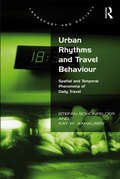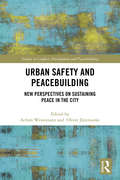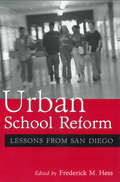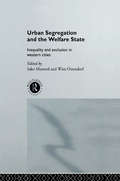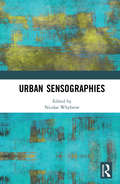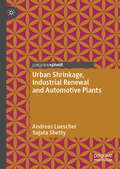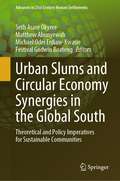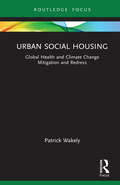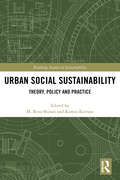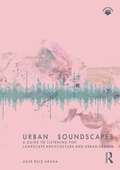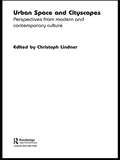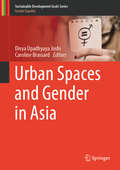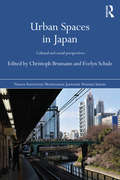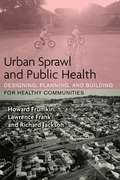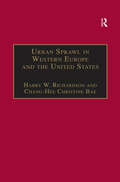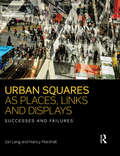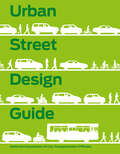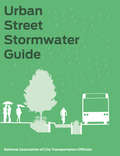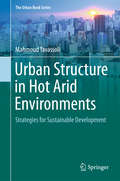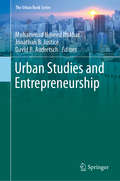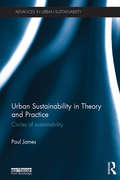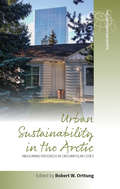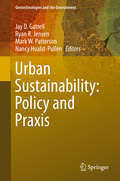- Table View
- List View
Urban Rhythms and Travel Behaviour: Spatial and Temporal Phenomena of Daily Travel
by Kay W. Axhausen Stefan SchönfelderThe recent availability of longitudinal data on individual trip making and activity behaviour has provided analysts with new insights into the structures and motives of daily life travel. Multi-week travel diary data-sets and GPS observations are exciting sources of information for the description and modelling of the variability of individual travel patterns. Through an analysis of these strong new data sets, this book questions what are the most suitable methodological tools to represent the structures of long-term travel behaviour. It also examines what the data tells us about the travellers' motives and looks at how planning should translate the findings into forecasting tools and transport strategies. In doing so, the multifaceted and ambiguous character of daily life travel is revealed, illustrating how, while sound routines in time and space seem to dominate daily life, individuals show a considerable amount of variability and flexibility in travel and activity behaviour.
Urban Safety and Peacebuilding: New Perspectives on Sustaining Peace in the City (Studies in Conflict, Development and Peacebuilding)
by Oliver Jütersonke Achim WennmannThis volume draws together original research related to conceptual and practical advances at the interface of urban safety and peacebuilding. The book reflects the advances in urban safety and peacebuilding to help address the rapidly increasing risk of conflict and insecurity in cities. Specifically, it draws on contributions to the Technical Working Group on the Confluence of Urban Safety and Peacebuilding Practice, an informal expert network co-facilitated by the United Nations Office at Geneva, UN-Habitat’s Safer Cities Programme, and the Geneva Peacebuilding Platform. A focus on ‘sustaining peace’ serves as a framework for situating new policy responses against conflict, violence, and exclusion in the city, and for promoting a conversation across disciplinary and specialist silos. The volume thereby broadens the optic of peacebuilding practice beyond interstate and intrastate armed conflicts – and especially their aftermath – and reconnects it to the community-level origins of building peace. The analysis and practice presented here will remind those willing to work towards peaceful and inclusive cities that there are tried and tested approaches available, and a host of experts and practitioners ready to accompany those prepared to lead in their respective contexts. This book will be of interest to students and researchers in the fields of peacebuilding, urban studies, security studies, and international relations.
Urban School Reform: Lessons from San Diego
by Frederick M. HessAn indispensable book for administrators, policymakers, scholars, and practitioners, Urban School Reform presents a revealing portrait of reform efforts while identifying the full range of issues that education reformers will need to address in districts across the country in the years ahead. Today's urban school reformers face a bewildering array of challenges. Urgent problems pertaining to governance, management, labor relations, classroom instruction, and numerous other areas face those who wish to reform and improve urban schools. Having undergone one of the nation's most comprehensive school reform efforts in recent years, San Diego has been a site of nationwide interest--one that is uncommonly well suited to learning about the challenges facing all reformers. This timely book addresses the full range of critical issues pertaining to urban school reform by looking closely at the recent reform efforts in San Diego. In essays by an impressive gathering of scholars and practitioners from across the country, the book considers crucial dimensions of reform efforts in the San Diego schools, including performance, governance, the external environment, central leadership and management, district infrastructure, support services, and school-level instructional efforts. The result is a full-scale assessment of San Diego's reform efforts--a record of unmistakable relevance and value to other urban reform movements throughout the United States.
Urban School Reform: Lessons from San Diego
by Frederick M. HessAn indispensable book for administrators, policymakers, scholars, and practitioners, Urban School Reform presents a revealing portrait of reform efforts while identifying the full range of issues that education reformers will need to address in districts across the country in the years ahead. Today's urban school reformers face a bewildering array of challenges. Urgent problems pertaining to governance, management, labor relations, classroom instruction, and numerous other areas face those who wish to reform and improve urban schools. Having undergone one of the nation's most comprehensive school reform efforts in recent years, San Diego has been a site of nationwide interest--one that is uncommonly well suited to learning about the challenges facing all reformers. This timely book addresses the full range of critical issues pertaining to urban school reform by looking closely at the recent reform efforts in San Diego. In essays by an impressive gathering of scholars and practitioners from across the country, the book considers crucial dimensions of reform efforts in the San Diego schools, including performance, governance, the external environment, central leadership and management, district infrastructure, support services, and school-level instructional efforts. The result is a full-scale assessment of San Diego's reform efforts--a record of unmistakable relevance and value to other urban reform movements throughout the United States.
Urban Segregation and the Welfare State: Inequality and Exclusion in Western Cities
by Sako Musterd Wim OstendorfUrban Segregation and the Welfare State examines ethnic and socio-economic segregation patterns, social polarisation, and social exclusion in major cities in the Western world. Contributors from across North America and Europe provide in-depth analysis of particular cities, ranging from Johannesburg, Chicago and Toronto to Amsterdam, Stockholm and Belfast. The authors highlight the social problems in and of cities, indicating differences between nation-states in terms of economic restructuring, migration, welfare state regimes and "ethnic history".
Urban Sensographies
by Nicolas WhybrowUrban Sensographies views the human body as a highly nuanced sensor to explore how various performance-based methods can be implemented to gather usable ‘felt data’ about the environment of the city as the basis for creating embodied mappings. The contributors to this fascinating volume seek to draw conclusions about the constitution, character and morphology of urban space as public, habitable and sustainable by monitoring the reactions of the human body as a form of urban sensor. This co-authored book is centrally concerned, as a symptom of the degree to which cities are evolving in the 21st century, to examine the effects of this change on the practices and behaviours of urban dwellers. This takes into account such factors as: defensible, retail and consumer space; legacies of modernist design in the built environment; the effects of surveillance technologies, motorised traffic and smart phone use; the integration of ‘wild’ as well as ‘domesticated’ nature in urban planning and living; and the effects of urban pollution on the earth’s climate. Drawing on three years of funded practical research carried out by a multi-medial team of researchers and artists, this book analyses the presence and movement of the human body in urban space, which is essential reading for academics and practitioners in the fields of dance, film, visual art, sound technology, digital media and performance studies.
Urban Shrinkage, Industrial Renewal and Automotive Plants
by Andreas Luescher Sujata ShettyThis book focuses on the relationship between the auto industry and the built environment at multiple scales, a topic of particular interest now as the industry is going through a period of major transformation. Drawing from multiple perspectives, including architecture, urban design and urban planning, the authors examine the changing form of the auto factory itself, the changing geography of auto production, and the challenges faced by communities as the auto plants that once brought them prosperity, and often a sense of identity, leave town. They examine four places that are dealing in different ways, and with varying success, with the aftermath of a decommissioned auto plant in their midst. These are Janesville, Wisconsin, and Willow Run, Michigan, in the U.S., and Bochum, Germany, and Genk, Belgium, in Europe. Together these four cases provide some clues about what the future might look like for places that were once intimately connected with the manufacture of cars.
Urban Slums and Circular Economy Synergies in the Global South: Theoretical and Policy Imperatives for Sustainable Communities (Advances in 21st Century Human Settlements)
by Michael Odei Erdiaw-Kwasie Seth Asare Okyere Matthew Abunyewah Festival Godwin BoatengThis book takes a theoretical and empirical distance from urban slums/low-income settlements as a threat to environmental sustainability and recast them as places where environmentally rehabilitative and circular practices occur—drawing on the theoretical lens of the circular economy (CE). CE is defined as regenerative system that minimizes waste, emission, and energy leakage by slowing, closing, and narrowing material and energy loops. In principle, CE departs from the traditional linear model of take-make-use-dispose. As conceived in urban contexts, circular cities offer possibilities to regenerate natural systems, design out waste, and keep products in use. While the CE key principles of reduce, repair, and reuse are essential to the sustainable and inclusive interventions in urban slums, there is lack of case studies exploring the role of place and agency, especially the slum living-CE nexus in global south contexts. In inequitable urban transitions, a nuanced understanding of thesynergies between urban slums and the circular economy is not only theoretically relevant for reconceptualizing the slum in urban sustainability discourses but also exert policy and practice ramifications to decidedly figure out how the urban slum phenomenon can foster the sustainable and inclusive development of marginal areas through contextual and people-centered initiatives.
Urban Social Housing: Global Health and Climate Change Mitigation and Redress
by Patrick WakelyThis book proposes operational approaches to public sector support to community-led development of urban low-income group social housing in the prevailing and medium-term. Within the context of mitigating and redressing the existential threats of climate change and global pathogenic transmission, building on current concerns of global heating and the lessons learnt from the 2020-22 COVID-19 pandemic, the book closely examines recent examples from a wide international range of countries and cities from the Sri Lanka experience to Arab States of the Middle East and the Andes. Topics include maintenance and management of public sector housing, poverty alleviation objectives, climate change mitigation, housing density, local land management and planning, land rights, affordable housing markets, and international governance and administration, ultimately pointing to the universal need for institutional, organisational and human skills development and the compilation and dissemination of operationally successful examples of participatory partnerships for affordable social housing. The book will be of interest to researchers, instructors, practitioners, and students of urban development, housing, environmental design, land-use planning, public administration and environmental health engineering.
Urban Social Sustainability: Theory, Policy and Practice (Routledge Studies in Sustainability)
by Ramin Keivani M. ShiraziThis ground breaking volume raises radical critiques and proposes innovative solutions for social sustainability in the built environment. Urban Social Sustainability provides an in-depth insight into the discourse and argues that every urban intervention has a social sustainability dimension that needs to be taken into consideration, and incorporated into a comprehensive and cohesive ‘urban agenda’ that is built on three principles of recognition, integration, and monitoring. This should be achieved through a dialogical and reflexive process of decision-making. To achieve sustainable communities, social sustainability should form the basis of a constructive dialogue and be interlinked with other areas of sustainable development. This book underlines the urgency of approaching social sustainability as an urban agenda and goes on to make suggestions about its formulation. Urban Social Sustainability consists of original contributions from academics and experts within the field and explores the significance of social sustainability from different perspectives. Areas covered include urban policy, transportation and mobility, urban space and architectural form, housing, urban heritage, neighbourhood development, and urban governance. Drawing on case studies from a number of countries and world regions the book presents a multifaceted and interdisciplinary understanding from social sustainability in urban settings, and provides practitioners and policy makers with innovative recommendations to achieve more socially sustainable urban environment.
Urban Soundscapes: A Guide to Listening for Landscape Architecture and Urban Design
by Usue Ruiz AranaSound and listening are intrinsically linked to how we experience and engage with places and communities. This guide puts forward a new conceptual framework of embodied affectivity that emphasises listening in urban research and design and advances new ways of knowing and making. The guide invites landscape architects and urban designers to become soundscape architects and offers practical advice on sound and listening applicable to each stage of a design project: from reading the environment to intervening on it.Urban Soundscapes foregrounds listening as an affective mediator between subjects and multispecies environments, and a vehicle to think and conceptualise environmental research and design beyond prevailing visual and human-centred modes. The guide expands landscape architects’ and urban designers’ tools and skills to assess existing soundscapes, predict how those soundscapes will be altered through their designs, consider sound as a creative and active part of the design process and envisage how users might perceive and be affected by those soundscapes as they evolve in time. The volume sits in the interface of research and practice and interweaves theoretical, methodological and creative contributions from acoustic ecology, ecoacoustics, bioacoustics and sound art. Each of the design stages is illustrated through project examples that demonstrate the many advantages of incorporating attentive listening and sound into Landscape Architecture and Urban Design Practice. This book shows how incorporating listening and sounding as part of the design process promotes slow and subtle ways of practice, adds social and ecological value through the reduction of noise pollution and by monitoring the health of habitats, and enables the design of soundscapes that complement the character and design intent of a scheme and elicit joy and wonder.The book will be of interest to practitioners and academics in landscape architecture, and other design and spatial fields such as urban design, architecture, geography and engineering, who play a primary role in the composition of the soundscape.
Urban Space and Cityscapes: Perspectives from Modern and Contemporary Culture (Questioning Cities)
by Christoph LindnerFrom the verticals of New York, Hong Kong and Singapore to the sprawls of London, Paris and Jakarta, this interdisciplinary volume of new writing examines constructions, representations, imaginations and theorizations of 'cityscapes' in modern and contemporary culture. With specially-commissioned essays from the fields of cultural theory, architecture, film, literature, visual art and urban geography, it offers fresh insight into the increasingly complex relationship between urban space, cultural production and everyday life. This volume draws on critical urban studies and moves beyond familiar cultural representations of the city by considering urban planning and architecture. Organized under three inter-related themes - image, text and form - essay topics range from the examination of cyberpunk skylines, pagan urbanism and the cinema of urban disaster, to the analysis of iconic city landmarks such as the twin towers, the London Eye and the Judisches Museum Berlin. Covering a diverse range of cities, including Berlin, Chicago, Jakarta, Johannesburg, Hong Kong, London, Los Angeles, Paris, and Venice, this fantastic resource for students, scholars and researchers alike, works expertly at the intersections of visual, material, and literary culture.
Urban Spaces and Gender in Asia (Sustainable Development Goals Series)
by Caroline Brassard Divya Upadhyaya JoshiExploring the relationship between place and identity, this book gathers 30 papers that highlight experiences from throughout the Asia-Pacific region. The countries profiled include China, India, Japan, Indonesia, and Thailand. Readers will gain a better understanding of how urbanization is affecting gender equity in Asian-Pacific cities in the 21st century. The contributing authors examine the practical implications of urban development and link them with the broader perspective of urban ecology. They consider how visceral experiences connect with structural and discursive spheres. Further, they investigate how multiple, interconnected relations of power shape gender (in)equity in urban ecologies, and address such issues as construction of Kawaii as an idealized femininity, diversity among homosexuals in urban India, and single women and rental housing. In turn, the authors present hitherto unexplored sub-themes from historiography and existentialist literary perspectives, and share a vast range of multi-disciplinary views on issues concerning gendered dispossession due to the impact of urban policy and governance. The topics covered include socio-spatial and ethnic segregation in urban spaces; intersections of gender, race, ethnicity, nationality, religion, and caste in urban spaces; and identity-based marginalization, including that of LGBT groups. Overall, the book brings together perspectives from the humanities and the social sciences, and represents a valuable contribution to the vital theoretical and practical debates on urbanism and gender equity.
Urban Spaces in Japan: Cultural and Social Perspectives (Nissan Institute/Routledge Japanese Studies)
by Christoph Brumann Evelyn SchulzUrban Spaces in Japan explores the workings of power, money and the public interest in the planning and design of Japanese space. Through a set of vivid case studies of well-known Japanese cities including Tokyo, Kobe, and Kyoto, this book examines the potential of civil society in contemporary planning debates. Further, it addresses the implications of Japan's biggest social problem – the demographic decline – for Japanese cities, and demonstrates the serious challenges and exciting possibilities that result from the impending end of Japan's urban growth. Presenting a synthetic approach that reflects both the physical aspects and the social significance of urban spaces, this book scrutinizes the precise patterns of urban expansion and shrinkage. In doing so, it also summarizes current theories of public space, urban space, and the body in space which are relevant to both Japan and the wider international debate. With detailed case studies and more general reflections from a broad range of disciplines, this collection of essays demonstrates the value of cross-disciplinary cooperation. As such, it is of interest to students and scholars of geography and urban planning as well as history, anthropology and cultural studies.
Urban Sprawl and Public Health: Designing, Planning, and Building for Healthy Communities
by Richard J. Jackson Howard Frumkin Lawrence FrankIn Urban Sprawl and Public Health, Howard Frumkin, Lawrence Frank, and Richard Jackson, three of the nation's leading public health and urban planning experts explore an intriguing question: How does the physical environment in which we live affect our health? For decades, growth and development in our communities has been of the low-density, automobile-dependent type known as sprawl. The authors examine the direct and indirect impacts of sprawl on human health and well-being, and discuss the prospects for improving public health through alternative approaches to design, land use, and transportation.Urban Sprawl and Public Health offers a comprehensive look at the interface of urban planning, architecture, transportation, community design, and public health. It summarizes the evidence linking adverse health outcomes with sprawling development, and outlines the complex challenges of developing policy that promotes and protects public health. Anyone concerned with issues of public health, urban planning, transportation, architecture, or the environment will want to read Urban Sprawl and Public Health.
Urban Sprawl in Western Europe and the United States (Urban Planning and Environment)
by Chang-Hee Christine BaeUrban sprawl is one of the key planning issues today. This book compares Western Europe and the USA, focusing on anti-sprawl policies. The USA is known for its settlement patterns that emphasize low-density suburban development and extreme automobile dependence, whereas European countries emphasize higher densities, pro-transit policies and more compact urban growth. Yet, on closer inspection, the differences are not as wide as first appears. A key feature of the book is the attention given to France; its experience is little known in the English-speaking world. The book concludes that both continents can offer each other useful insights and perhaps policy guidance.
Urban Squares as Places, Links and Displays: Successes and Failures
by Jon Lang Nancy MarshallTo attract investment and tourists and to enhance the quality of life of their citizens, municipal authorities are paying considerable attention to the quality of the public domain of their cities – including their urban squares. Politicians find them good places for rallies. Children consider squares to be playgrounds, the elderly as places to catch-up with each other, and for many others squares are simply a place to pause for a moment. Urban Squares as Places, Links and Displays: Successes and Failures discusses how people experience squares and the nature of the people who use them. It presents a ‘typology of squares’ based on the dimensions of ownership, the square’s instrumental functions, and a series of their basic physical attributes including size, degree of enclosure, configuration and organization of the space within them and finally based on their aesthetic attributes – their meanings. Twenty case studies illustrate what works and what does not work in different cities around the world. It discusses the qualities of lively squares and quieter, more restorative places as well as what contributes to making urban squares less desirable as destinations for the general public. The book closes with the policy implications, stressing the importance and difficulties of designing good public places. Urban Squares offers how-to guidance along with a strong theoretical framework making it ideal for architects, city planners and landscape architects working on the design and upgrade of squares.
Urban Street Design Guide
by National Association of City Transportation OfficialsThe NACTO Urban Street Design Guide shows how streets of every size can be reimagined and reoriented to prioritize safe driving and transit, biking, walking, and public activity. Unlike older, more conservative engineering manuals, this design guide emphasizes the core principle that urban streets are public places and have a larger role to play in communities than solely being conduits for traffic. The well-illustrated guide offers blueprints of street design from multiple perspectives, from the bird's eye view to granular details. Case studies from around the country clearly show how to implement best practices, as well as provide guidance for customizing design applications to a city's unique needs. Urban Street Design Guide outlines five goals and tenets of world-class street design: * Streets are public spaces. Streets play a much larger role in the public life of cities and communities than just thoroughfares for traffic. * Great streets are great for business. Well-designed streets generate higher revenues for businesses and higher values for homeowners. * Design for safety. Traffic engineers can and should design streets where people walking, parking, shopping, bicycling, working, and driving can cross paths safely. * Streets can be changed. Transportation engineers can work flexibly within the building envelope of a street. Many city streets were created in a different era and need to be reconfigured to meet new needs. * Act now! Implement projects quickly using temporary materials to help inform public decision making. Elaborating on these fundamental principles, the guide offers substantive direction for cities seeking to improve street design to create more inclusive, multi-modal urban environments. It is an exceptional resource for redesigning streets to serve the needs of 21st century cities, whose residents and visitors demand a variety of transportation options, safer streets, and vibrant community life.
Urban Street Stormwater Guide
by National Association of City Transportation OfficialsThe Urban Street Stormwater Guide begins from the principle that street design can support—or degrade—the urban area's overall environmental health. By incorporating Green Stormwater Infrastructure (GSI) into the right-of-way, cities can manage stormwater and reap the public health, environmental, and aesthetic benefits of street trees, planters, and greenery in the public realm.Building on the successful NACTO urban street guides, the Urban Street Stormwater Guide provides the best practices for the design of GSI along transportation corridors.The state-of-the-art solutions in this guide will assist urban planners and designers, transportation engineers, city officials, ecologists, public works officials, and others interested in the role of the built urban landscape in protecting the climate, water quality, and natural environment.
Urban Structure in Hot Arid Environments
by Mahmoud TavassoliThis essential reference guide to strategies and solutions for urban planning in hot arid environments reflects the journey toward many cities, towns and villages in Iran, which are documented and presented in the form of case studies and comparative analysis. It is the outcome of extensive research on the influence of historical, cultural and climatic factors on urban spatial forms and rural complexes in Iran's Hot Arid Zone. The environment of the Hot Arid Zone offers valuable insights into how to overcome historical difficulties, how to endure harsh climatic conditions, how to be innovative and creative in responding to problems in new ways, and how to utilize natural energy sources. Considerable attention is given to the recognition of values, current problems and the renewal of traditional fabrics, urban blocks and traditional buildings. Important aspects in both academic education and in the urban design profession include traditional urban structures and traditional approaches to using natural energy as a creative process that is continuously changing and renews itself over time - a dynamic characteristic from which we can glean many lessons for the future. This book is based on a book previously published by the author in Persian. This version is an extensively revised version.
Urban Studies and Entrepreneurship (The Urban Book Series)
by David B. Audretsch Muhammad Naveed Iftikhar Jonathan B. JusticeThis book attempts to advance critical knowledge and practices for fostering a variety of entrepreneurship at a city level. The book aims to connect scholarship and policy practice in two disciplines: Urban Studies and Entrepreneurship. The book has included contributions from developed, emerging, and developing countries. The chapters are clubbed under five main sections; I. Startups and Entrepreneurial Opportunities, II. Knowledge Spillover, III. Social and Bureaucratic Entrepreneurialism, IV. Demography and Informal Entrepreneurs V. Perspectives from Emerging and Developing Economies.In this regard, the book explores a number of questions, such as: what are the important varieties of entrepreneurship, how can they be observed and measured, and how does each variety emerge and operate under various conditions of infrastructure and opportunity? Which type(s) of entrepreneurship should a city prefer? What can cities do to stimulate desirable forms of entrepreneurship or is it more of a spontaneous phenomenon? Why do policies that enhance entrepreneurship in some contexts seem instead to promote crony capitalism and rent-seeking in other contexts? Should cities focus on growing their own entrepreneurs and entrepreneurial enterprises or on luring them from other cities and countries? How can a collective action in a city promote (or hinder) entrepreneurship? The contributions in the present volume address head-on these questions at the intersection of urban studies, economic theory, and the practicalities of economic development and urban governance, in a genuinely global range of places and applications.
Urban Sustainability
by Ann Dale William Dushenko Pamela J. RobinsonGiven ongoing concerns about global climate change and its impacts on cities, the need for sustainable planning has never been greater. This book explores concrete ways to achieve urban sustainability based on integrated planning, policy development, and decision-making. Urban Sustainability is the first book to provide an applied interdisciplinary perspective on the challenges and opportunities that lay ahead in this area. Bringing together researchers and practitioners to explore leading innovations on the ground, this volume combines the theoretical underpinnings of urban sustainability with current practices through highly readable narrative case studies. The contributors also provide fresh perspectives on how issues related to sustainable urban planning and development can be reconciled through collaborative partnerships and engagement processes.
Urban Sustainability in Theory and Practice: Circles of sustainability (Advances in Urban Sustainability)
by Paul JamesCities are home to the most consequential current attempts at human adaptation and they provide one possible focus for the flourishing of life on this planet. However, for this to be realized in more than an ad hoc way, a substantial rethinking of current approaches and practices needs to occur. Urban Sustainability in Theory and Practice responds to the crises of sustainability in the world today by going back to basics. It makes four major contributions to thinking about and acting upon cities. It provides a means of reflexivity learning about urban sustainability in the process of working practically for positive social development and projected change. It challenges the usually taken-for-granted nature of sustainability practices while providing tools for modifying those practices. It emphasizes the necessity of a holistic and integrated understanding of urban life. Finally it rewrites existing dominant understandings of the social whole such as the triple-bottom line approach that reduce environmental questions to externalities and social questions to background issues. The book is a much-needed practical and conceptual guide for rethinking urban engagement. Covering the full range of sustainability domains and bridging discourses aimed at academics and practitioners, this is an essential read for all those studying, researching and working in urban geography, sustainability assessment, urban planning, urban sociology and politics, sustainable development and environmental studies.
Urban Sustainability in the Arctic: Measuring Progress in Circumpolar Cities (Studies in the Circumpolar North #3)
by Robert W. OrttungUrban Sustainability in the Arctic advances our understanding of cities in the far north by applying elements of the international standard for urban sustainability (ISO 37120) to numerous Arctic cities. In delivering rich material about northern cities in Alaska, Canada, and Russia, the book examines how well the ISO 37120 measures sustainability and how well it applies in northern conditions. In doing so, it links the Arctic cities into a broader conversation about urban sustainability more generally.
Urban Sustainability: Policy and Praxis
by Ryan R. Jensen Jay D. Gatrell Mark W. Patterson Nancy Hoalst-PullenThis book explores the environmental, economic, and socio-political dynamics of sustainability from a geographic perspective. The chapters unite the often disparate worlds of environment, economics, and politics by seeking to understand and visualize a range of sustainability practices on the ground and in place. In concert, the book provides an overview of a range of geotechnical applications associated with environmental change (water resources, land use & land cover change); as well as investigates more nuanced and novel examples of local economic development in cities. The diverse collection maps local practices from urban farming to evolving and thriving industries such as metal scrapping and craft beer. Additionally, the book provides an integrated geo-technical framework for understanding and assessing ecosystem services, explores the deployment of unmanned systems to understand urban environmental change, interrogates the spatial politics of urban green movements, examines the implications of revised planning practices, and investigates environmental justice. The book will be of interest to researchers, students, and anyone seeking to better understand sustainability at multiple scales in urban environments.
